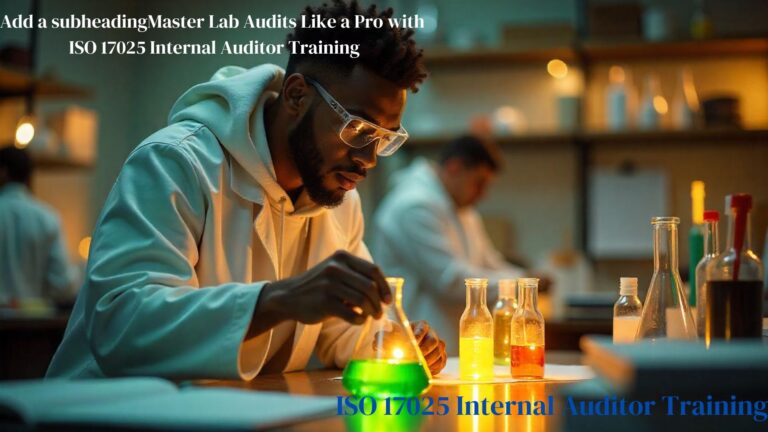So, You Want to Be an ISO 17025 Internal Auditor? Let’s Talk.
Testing and calibration labs live and breathe precision. Everything—down to the last decimal point—has to be spot on. And that’s exactly why ISO 17025 exists: to make sure labs are competent, reliable, and globally recognized. But here’s the thing—certification isn’t a one-time deal. Maintaining compliance is an ongoing process, and that’s where internal auditors come in. Think of internal auditors as the quality guardians. They ensure that a lab’s processes, equipment, and documentation meet ISO 17025 standards. But how do you become one? What does the training involve? And—let’s be honest—how challenging is it really?What Exactly Is ISO 17025 Internal Auditor Training?
ISO 17025 internal auditor training is designed to teach professionals how to assess a lab’s compliance with the standard. It’s not just about checking boxes or reviewing SOPs (standard operating procedures); it’s about understanding the deeper principles behind the requirements. This training typically covers:- The structure and principles of ISO 17025
- How to plan, conduct, and report internal audits
- Risk-based thinking and corrective actions
- Handling nonconformities without making enemies (yes, that’s a skill!)
- Continuous improvement strategies
- Documentation and record-keeping best practices
- How to communicate findings effectively to management and teams
Who Needs This Training?
If you work in a testing or calibration lab and have been voluntarily to take on auditing duties, this is for you. But it’s not just for auditors—quality managers, lab technicians, and even supervisors benefit from understanding how audits work. In some cases, regulatory bodies or customers might even require labs to have trained internal auditors on staff. Some specific roles that benefit from this training include:- Quality Managers – Ensuring compliance with accreditation requirements.
- Lab Technicians & Analysts – Understanding audit expectations and improving daily operations.
- Regulatory Affairs Personnel – Maintaining lab credibility with external bodies.
- Senior Management – Overseeing lab-wide compliance efforts and setting quality goals.
What Makes a Good Internal Auditor?
Let’s get one thing straight: internal auditing isn’t about nitpicking every minor mistake. A great auditor is more than a compliance enforcer—they’re a problem solver, a critical thinker, and (ideally) a good communicator. Here are some must-have traits:- Attention to detail – You’re spotting issues others might miss.
- Strong analytical skills – It’s not just about identifying nonconformities; it’s about understanding why they happen.
- People skills – Nobody likes being audited. A little empathy goes a long way.
- Objectivity – Your job is to assess, not accuse.
- Adaptability – Every lab operates differently, and audits require flexibility in approach.
- Curiosity – Asking the right questions leads to meaningful improvements.
The Training Experience: What to Expect
ISO 17025 internal auditor training can be done online or in-person, depending on the provider. Most courses run for two to three days and include a mix of lectures, case studies, and practical exercises. A typical training flow looks like this:- Introduction to ISO 17025 – Understanding the structure and requirements.
- Audit Fundamentals – Learning about audit principles, types, and methodologies.
- Planning an Audit – Preparing checklists, defining objectives, and scheduling.
- Conducting the Audit – Interviewing, collecting evidence, and documenting findings.
- Reporting & Corrective Actions – Writing audit reports and ensuring improvements happen.
- Role-Playing Exercises – Simulated audits to practice real-world scenarios.
How Hard Is the Exam? (And Should You Worry?)
Most training programs end with an assessment. Don’t panic—it’s not designed to trick you. Expect multiple-choice questions, case study analyses, and maybe some scenario-based questions. If you paid attention during training (and took decent notes), you’ll be fine. Some providers may also include:- Open-book assessments
- Group discussions for problem-solving
- Practical application through real audit documentation
What Happens After Training?
Once you pass, you’re officially trained—but training alone doesn’t make you a seasoned auditor. The real learning happens when you conduct actual audits. Most labs pair new auditors with experienced ones for mentorship and guidance. And here’s a little secret: your first audit will feel awkward. That’s normal. The key is to stay methodical, ask the right questions, and rely on your training. With each audit, you’ll gain confidence and a sharper eye for detail.The Role of Internal Auditors in Continuous Improvement
Internal auditors play a crucial role in pushing labs beyond mere compliance. Their insights can drive operational excellence by:- Identifying inefficiencies in lab processes
- Suggesting cost-effective solutions for common bottlenecks
- Encouraging a culture of accountability and quality awareness
- Providing early warnings about potential accreditation risks
- Reinforcing training and skill development to keep teams up to date
- Supporting management in strategic decision-making based on audit insights
The Bigger Picture: Why Internal Auditing Matters
Internal auditing isn’t just a formality—it’s the backbone of lab quality. A strong internal audit program ensures:- Consistent compliance with ISO 17025
- Early detection of nonconformities (before external auditors find them!)
- Improved lab processes and efficiency
- Increased confidence from customers and regulatory bodies
- Proactive risk management and error prevention
- A stronger reputation in the industry, attracting more clients and contracts
Finding the Right Training Provider
If you’re serious about ISO 17025 internal auditor training, choosing the right course is crucial. Consider:- Accreditation – Does the provider follow recognized training standards?
- Instructor Experience – Are the trainers experienced auditors themselves?
- Mode of Training – Online vs. in-person: which suits your learning style?
- Post-Training Support – Are there resources, templates, or mentorship options available?
- Cost vs. Value – The cheapest option may not provide the best learning experience.
- The International Laboratory Accreditation Cooperation (ILAC)
- ISO-accredited training organizations
- Industry-specific professional bodies
